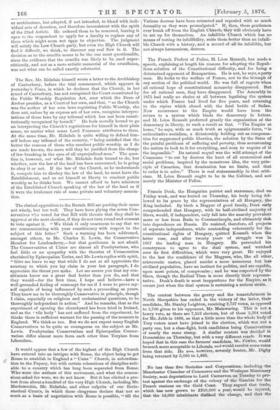The Rev. Mr. Ridsdale himself wrote a letter to the
Archbishop of Canterbury, before the trial commenced, which appears in yesterday's Times, in which he declares that the Church, in her synod of Canterbury, has not recognised the Court constituted by the Public Worship Regulation Act, over which the Dean of Arches presides, as a Court of her own, and that, "as the Church was the author of her own laws regulating Public Worship, she does not, unless by an express act of her own, recognise interpre- tations of those laws by any tribunal which has not been consti- tutionally recognised by herself." He feels morally bound to go on interpreting the Church's regulations for himself in their plain sense, no matter what sense Lord Penzance attributes to them. At the same time, Mr. Ridsdale is quite willing to defend him- self before any tribunal of the country, "being satisfied that the better the reasons of those who conduct public worship as I do are made known, the more will they be justified from the charge of law. breaking in the eyes of all unprejudiced men." The ques- tion is, however, not what Mr. Ridsdale feels bound to do, but whether, now the law of the land has been announced, he is going to obey it or not. If the law of the Church, as he understands it, compels him to disobey the law of the land, he must leave the Establishment, and so set himself at liberty to conduct public worship as he thinks best. We cannot afford to have ministers of the Established Church speaking of the law of the land as if it were the irrelevant rule of some private and voluntary associa- tion.


































 Previous page
Previous page